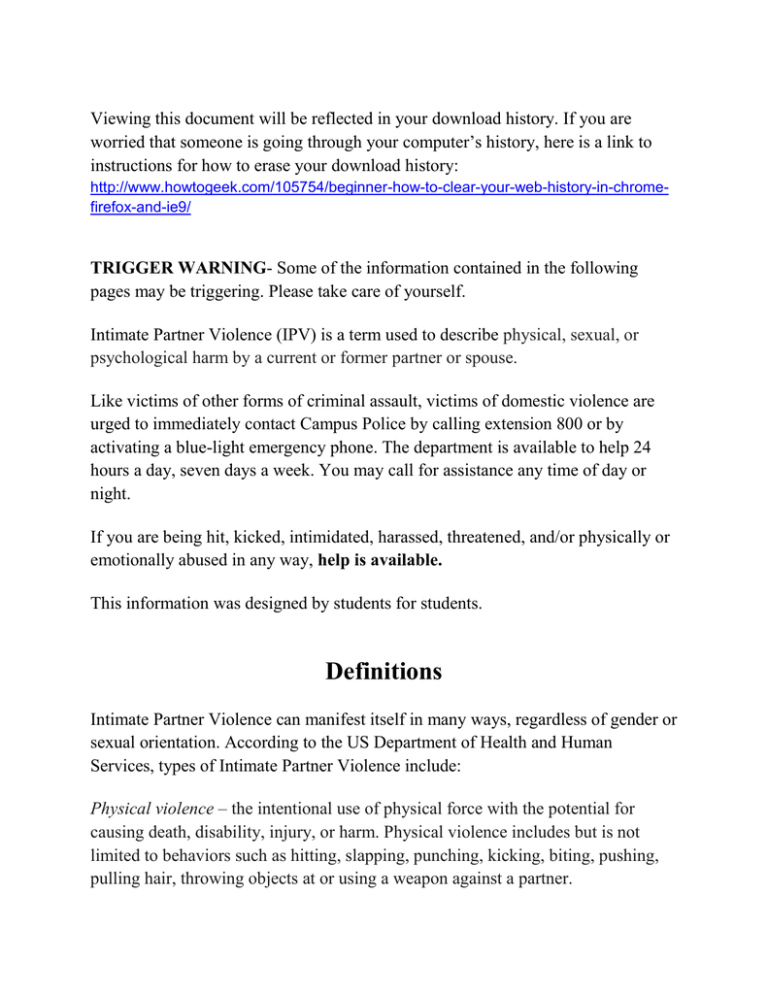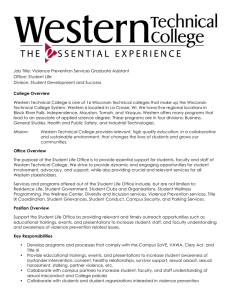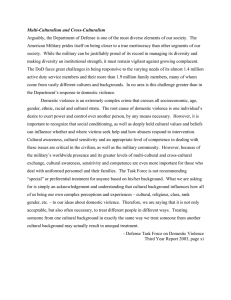
Viewing this document will be reflected in your download history. If you are
worried that someone is going through your computer’s history, here is a link to
instructions for how to erase your download history:
http://www.howtogeek.com/105754/beginner-how-to-clear-your-web-history-in-chromefirefox-and-ie9/
TRIGGER WARNING- Some of the information contained in the following
pages may be triggering. Please take care of yourself.
Intimate Partner Violence (IPV) is a term used to describe physical, sexual, or
psychological harm by a current or former partner or spouse.
Like victims of other forms of criminal assault, victims of domestic violence are
urged to immediately contact Campus Police by calling extension 800 or by
activating a blue-light emergency phone. The department is available to help 24
hours a day, seven days a week. You may call for assistance any time of day or
night.
If you are being hit, kicked, intimidated, harassed, threatened, and/or physically or
emotionally abused in any way, help is available.
This information was designed by students for students.
Definitions
Intimate Partner Violence can manifest itself in many ways, regardless of gender or
sexual orientation. According to the US Department of Health and Human
Services, types of Intimate Partner Violence include:
Physical violence – the intentional use of physical force with the potential for
causing death, disability, injury, or harm. Physical violence includes but is not
limited to behaviors such as hitting, slapping, punching, kicking, biting, pushing,
pulling hair, throwing objects at or using a weapon against a partner.
Sexual violence – is divided into three categories: 1) use of physical force to
compel a person to engage in a sexual act against his or her will, whether or not
the act is completed; 2) attempted or completed sex act involving a person who is
unable to understand the nature or condition of the act, to decline participation, or
to communicate unwillingness to engage in the sexual act, e.g., because of illness,
disability, or the influence of alcohol or other drugs, or because of intimidation or
pressure; and 3) abusive sexual contact.
Threats of physical or sexual violence – use of words, gestures, or weapons to
communicate the intent to cause death, disability, injury or harm.
Emotional/Psychological violence – includes behaviors such as humiliation,
threats, intimidation to control one’s partner, verbal threats, including name calling
and put downs. The partner may control how and with whom the other person
spends time, limiting what they can wear, checking up on them frequently, and
making them feel that they cannot leave the relationship. This form of violence
may also include controlling how money is spent, using partner’s credit cards or
money without their permission, creating debt in partner’s name, and pressuring
the partner to use their income to support the abuser’s lifestyle/needs. Typically,
this form of abuse is the first to give signals of abuse. As the relationship
continues, the abuse may escalate to physical and/or sexual violence. In addition,
stalking is often included among the types of IPV. According to researchers at the
Department of Justice, stalking generally refers to "harassing or threatening
behavior that an individual engages in repeatedly, such as following a person,
appearing at a person's home or place of business, making harassing phone calls,
leaving written messages or objects, or vandalizing a person's property."
(http://www.hhs.gov/opa/familylife/tech_assistance/etraining/partner/definitions/index.html)
Statistics
More than 1 in 3 women (35.6%) and more than 1 in 4 men (28.5%) in the United
States have experienced rape, physical violence, and/or stalking by an intimate
partner in their lifetime.
Among victims of intimate partner violence, more than 1 in 3 women experienced
multiple forms of rape, stalking, or physical violence; 92.1% of male victims
experienced physical violence alone, and 6.3% experienced physical violence and
stalking.
About 1 in 4 women (24.3%) and 1 in 7 men (13.8%) have experienced severe
physical violence by an intimate partner (e.g., hit with a fist or something hard,
beaten, slammed against something) at some point in their lifetime.
Men and women who experienced rape or stalking by any perpetrator or physical
violence by an intimate partner in their lifetime were more likely to report frequent
headaches, chronic pain, difficulty with sleeping, activity limitations, poor physical
health and poor mental health than men and women who did not experience these
forms of violence.
Women who had experienced these forms of violence were also more likely to
report having asthma, irritable bowel syndrome, and diabetes than women who did
not experience these forms of violence.
(http://www.cdc.gov/ViolencePrevention/pdf/NISVS_Report2010-a.pdf)
Intimate Partner Violence in
Non-Heteronormative Relationships
Though Intimate Partner Violence in Non-Heteronormative relationships shares
many characteristics with IPV between heterosexual couples, there can also be key
differences.
Healthy vs. Unhealthy Relationship
Characteristics of healthy relationships:
● Equality: partners share decisions and responsibilities
● Honesty: partners share their fears, concerns, and feelings on important
information
● Physical safety: partners feel secure in each others presence and respect each
others space
● Comfort: partners respect each others differences, recognize when they are
wrong (can say “I’m sorry”) and can be themselves.
● Sexual Respect: partners are comfortable communicating about sex and
never force sexual activity.
● Independence: both partners maintain an independent identity, friends
outside the relationship, and the right to end the relationship.
● Humor: the relationship is enjoyable (laugh and have fun!)
Characteristics of Unhealthy Relationships:
● Control: one partner makes all decisions and tells the other what to do.
● Dishonesty: lying and stealing from each other.
● Physical abuse: using force to get his/her way.
● Disrespect: making fun of each others opinions and interests/ threatening to
destroy something that belongs to other partner.
● Intimidation: trying to control aspects of each others lives. Attempting to
keep family from friends, family, and threatening violence/ break-up
● Sexual abuse: pressuring sexual activity without partners will or consent.
● Dependence: feelings of being “unable to live without” partner, threatening
to do something drastic if relationship ends.
● Hostility: mean spirited teasing, the feeling of “walking on eggshells” to
avoid upsetting partner.
(http://www.safepass.org/)
Where Can I Go for Help?
There are many places both on campus and off campus that can provide support
services for a victim or survivor of Intimate Partner Violence.
The following resources are available on campus to provide support. Please be
reminded that when you use these on-campus resources, you should ask about
confidentiality and mandated reporting.
Campus Police● The department is located at 126 West Street in the Facilities Building. The
office is staffed from 8:30 a.m.-4 p.m., Monday-Friday.
● Dial 2490 from a campus phone or (413) 585-2490 from a cell phone or
from off campus, 24 hours a day.
● You can visit the Smith Campus Police website for more information about
Intimate Partner Violence at
http://www.smith.edu/campuspolice/safety_domestic.php
Counseling Services● To make an appointment, call (413) 585-2843 Monday through Friday, 9
a.m. to 4 p.m., or come to the Counseling Service office.
● Students are usually offered appointments within two or three days from the
time they call.
Health Services● Health services is open Monday through Friday, 8 a.m. to 8 p.m.
● To schedule an appointment: x2811
● To speak to a nurse during these hours: x2813
● When Health Services is closed, a nurse is available for phone consultation:
585-1260. A counselor is available by phone: 585-2840.
What Resources are Off Campus?
Northampton Police● For emergencies off campus, call 911
● If on campus, call Campus Police and then request to have the Northampton
Police
● For more information about the Northampton Police, visit their website at
http://www.northamptonpd.com/
Safe Passage● Safe Passage provides women with the support and information that they
need in order to make their own choices to keep themselves and their
children safe and to rebuild their lives in the wake of domestic violence.
● For more information about the services provided at Safe Passage, visit their
website at http://www.safepass.org/services.html
Center for Women and Community● We offer many services to meet the needs of the UMass Amherst, Five
College and local communities. If you, or someone you know is in need of
counseling, support groups, advocacy, or resources, they can help.
● For more information about the resources at The Center, visit their website
at http://www.umass.edu/ewc/gethelp/
The Network La Red
● Though located in Boston, La Red provides support services for LGBTQ
people.
● For more information call the hotline at 617-742-4911 (v)
617-227-4911 (tty) and ask for the Advocate.
● For more information about La Red, visit their website at http://tnlr.org/
Helping Others
Here are a list of common feelings, thoughts, and physical symptoms associated
with experiencing Intimate Partner Violence:
-shock
-anger/furious
-Conflicted
-fear
-Irritable
-Alone
-helplessness
-Stuck
-Lost
-emptiness
-Frozen
-Sad
-anxiety
-Confused -Ashamed -Shaking
-cold
-Forgetful
-Guilty
-nausea
-Exhausted
-Dizzy
-Worried -Insomnia
-Chest pain
-Racing heart
-Heavy
-Crying
-Numb
If a friend or acquaintance is in an abusive relationship or is recovering from one,
use the following guidelines to help them:
● Be non-judgemental
● Listen
● Reassure confidentiality
● Explore options/alternatives
● Don’t make choices for them
● Don’t take over but step in when needed
● Let person come to their own conclusions
If You Have Been Violent Toward Your Partner
● Know that you are not alone.
● Understand that violence is learned behavior. Violent, abusive behavior can
be changed.
● Take responsibility for your violent behavior. The first step to making
change is to acknowledge that there is a problem in need of change.
● Seek professional help.
(http://studentaffairs.depaul.edu/ucs/intimatepartnerviolence.html






